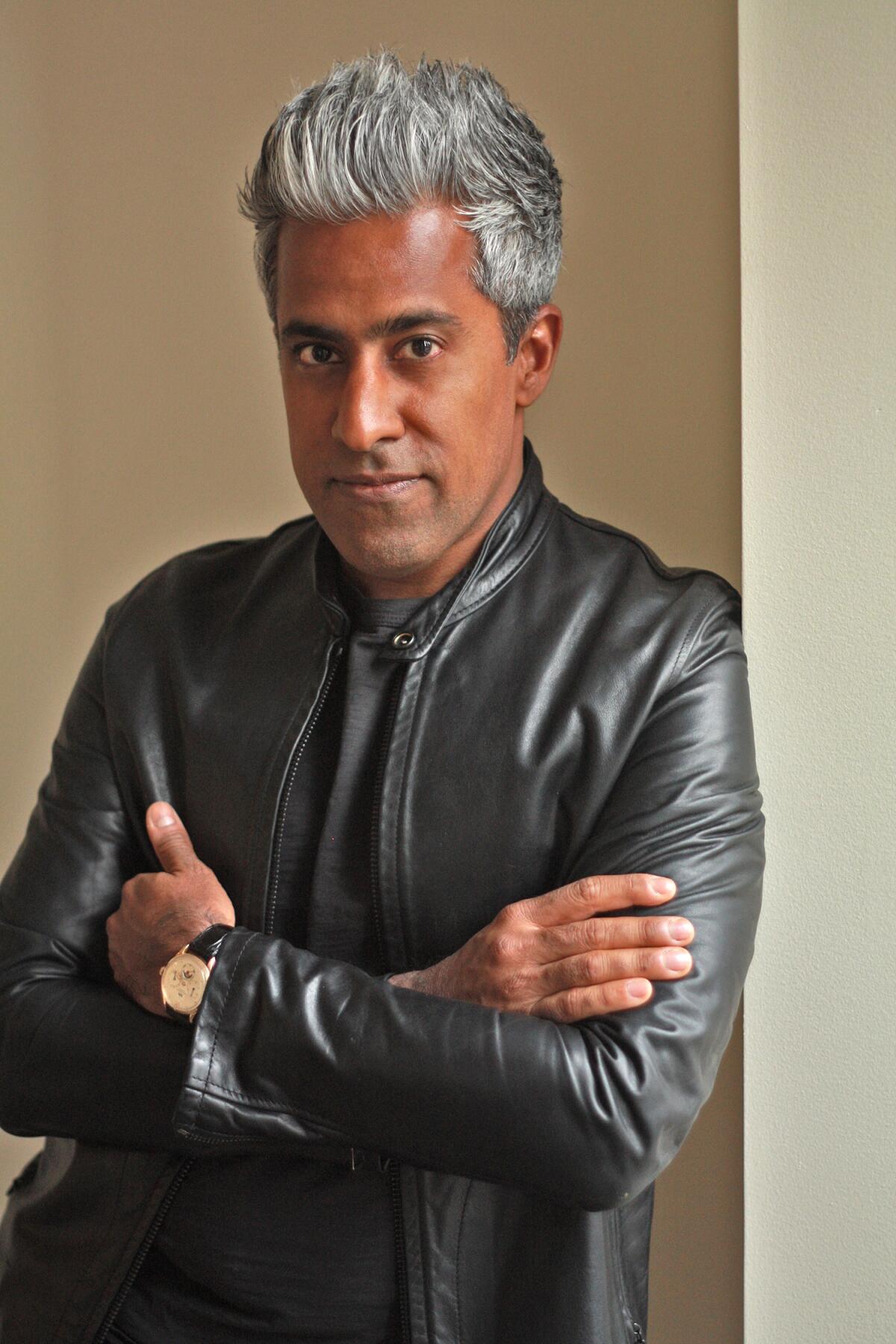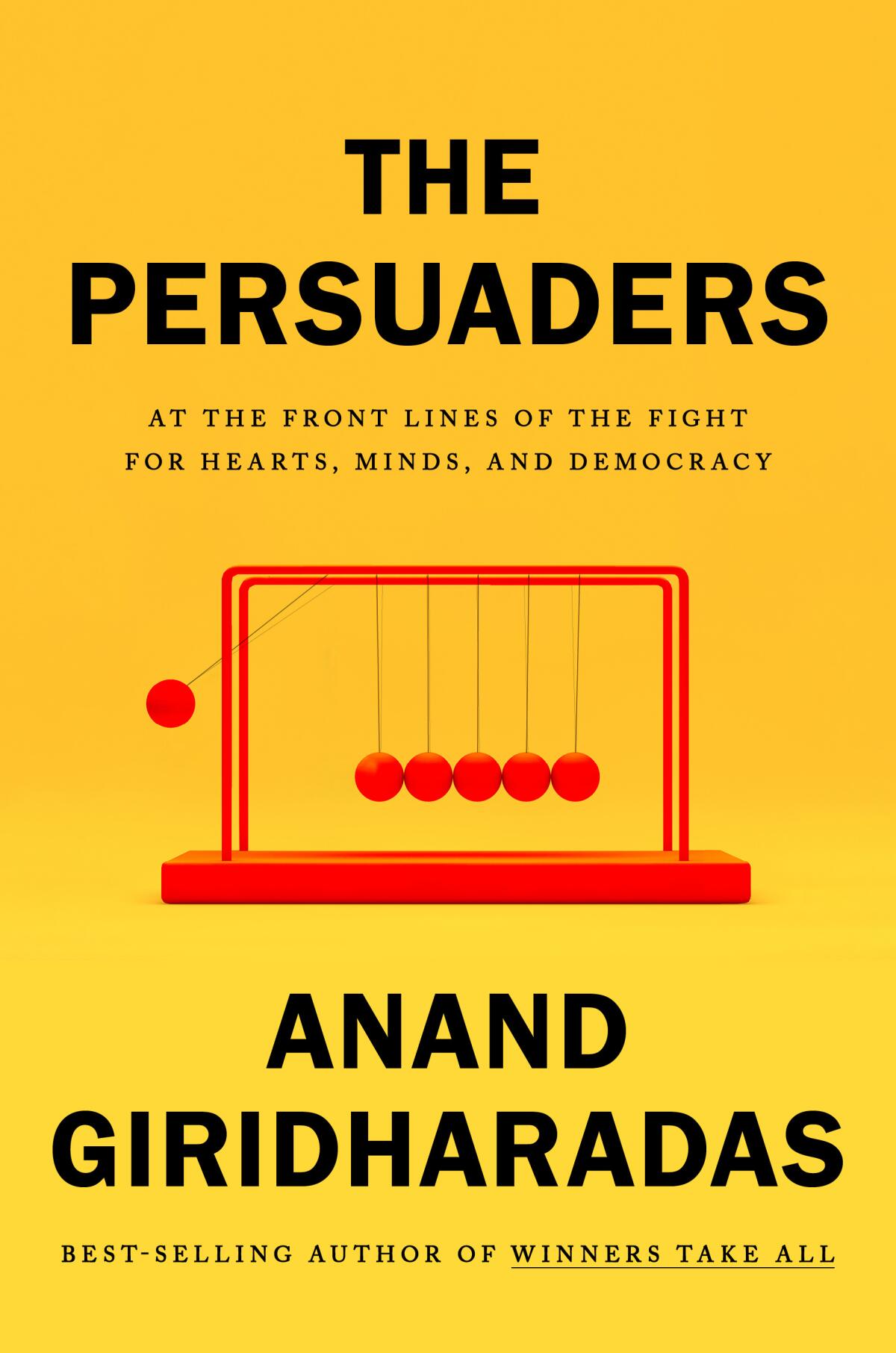Is anyone in the U.S. persuadable? An author talks to AOC and other ‘Persuaders’

- Share via
On the Shelf
'The Persuaders: At the Front Lines of the Fight for Hearts, Minds, and Democracy'
By Anand Giridharadas
Knopf: 352 pages, $30
If you buy books linked on our site, The Times may earn a commission from Bookshop.org, whose fees support independent bookstores.
In 2020, bestselling author Anand Giridharadas was feeling fatalistic about America’s future. His previous book, “Winners Take All,” examined how global elites conserved their wealth and power at the expense of progress or fairness. Now he was noticing that people he agreed with on common policy goals were giving up on trying to convince others of those ideas — never mind the basic realities of things like vaccines and election integrity. “It just became, ‘Don’t bother,’” he recalls.
Giridharadas understood the impulse, but he felt that giving in meant “basically declaring game over. If changing minds cannot happen, then this is the end of democracy.”
So he started spending time with people who still believed change was possible and were committed to making it happen. The result is “The Persuaders: At the Front Lines of the Fight for Hearts, Minds, and Democracy,” a book he calls a “hope tonic.”
The author talked to a wide array of activists and politicians, including Linda Sarsour, who helped push for more diverse viewpoints in the 2017 Women’s March; Diane Benscoter, who helps deprogram people who have been in cults; Anat Shenker-Osorio, a consultant who uses research to help clients understand how to motivate voters; and a former bartender by the name of Alexandria Ocasio-Cortez. He asked how they hope to nudge, coax and drag America toward a better future.
Sometimes, as in the case of Ocasio-Cortez and Bernie Sanders, they begin persuading people simply by pushing their ideas — like the forgiveness of student loan debt — into the public conversation. Others, like Cesar Torres, an undocumented immigrant who engages in “deep canvassing,” pursue lengthy conversations to engage voters one-on-one about issues where they might be open to a second look at an idea.
The global elite who descended on Davos are richer than ever.
“They led the book in this direction of being a more useful, practical book,” Giridharadas said recently in a video interview from his Brooklyn home. “This is the book for this moment, where the country is potentially pivoting toward fascism or toward a real multiracial democracy it has never been in the past.”
This interview has been edited for length and clarity.
Clearly it takes a ton of hands-on work to move the needle on social, racial and political topics. With a significant percentage of Americans not even believing in facts, can changes be made in time to save the country?
I am as despairing as anybody about where we are, but politics is not supposed to be easy or without conflict. We are historically a mostly white, mostly Christian, male-dominated society. But in our lifetime, it has drastically moved in the direction of being a completely other place. So we’re living through this turmoil for a reason, not just because we’re a nation of screw-ups.

We’ve had a gender revolution — which is good, but it’s complicated and a lot to cope with. The technological revolution is insane — no activity from the 1960s is the same today, especially with social media. And demographic change has us on trend to be a superpower of color in the near future. So of course our society might have issues and flare-ups and people who resent the changes.
We have to talk people through what is going on — and I’m not only talking about white men who voted for Trump. A whole lot of people are discombobulated. It is slow and grueling work and requires being on the ground and engaged in the community. But not only do I think it is working, I think it is the only way forward.
In the book, Ocasio-Cortez makes a distinction between bipartisanship, which she views as selling out, and finding common ground with others. How would you explain that?
The standard Democratic playbook is often about reaching out at the expense of standing for anything. You say, “Let’s save the planet,” then try to persuade people by lurching to the middle, tempering real ambition, seeking less and settling for some tax credits. Then on the activist side, people sometimes stand for their moral commitment without caring about outreach.
But some of the smartest persuaders in this book, including AOC, combine standing in your truth and moral commitment and reaching out. These people are saying, “How do we frame these truths so they’re attractive to more people?”
Annette Gordon-Reed, Ayad Akhtar, Héctor Tobar, Martha Minow, David Kaye and Jonathan Rauch discuss the Jan. 6 riot and what we do about it.
Instead of saying Medicare for All — naming the concept after a government program — use the language of freedom. My idea is that it should be called FreedomCare. That’s what the right would do. This really would make people more free. But I’ve never seen Democrats speak about this using that language of freedom and independence — from your boss, from bureaucrats.
The book is less about converting MAGA die-hards and more about smaller shifts among those open to change on a specific topic.
In our system, a 5% swing is the difference between two completely different ways of life. No one is talking about how you win back all the people who voted for Trump, but if a few million change, that’s a really different country. Is that possible? Yeah, because it happened. Enough people saw Trump as president and didn’t like it. They changed their minds.
There are enough people who vote for things that look like madness but are in play. People may have 40% good in their heart on an issue, with the awful part at 60%. Very few people are 100 to zero on anything.
But those true believers storm the Capitol and persuade Republicans to take unhinged positions. You make the case that returning politics to reality-based arguments involves cult deprogramming on a large scale.
It’s one thing to say I want low taxes and corporations should be left alone. We can haggle over that. But at least 40 million Americans are best understood as living in a cult, which is a sobering reality. We should try to tamp down disinformation and regulate media platforms, but that stuff is here to stay, so this is a public health problem.
What we have to do is figure out ways to reach people. The spirit with which we approach them — heavily reliant on shame and making people feel stupid — is all wrong. We have to recognize that people want the world to make easy sense. And people do not want to be anybody’s fool or pawn. So we have to lovingly say, “I’m concerned that you are being led astray by people who are using you for their own purposes and profiting from it.”
The heart of this answer is to build up within people the part that doesn’t want to be a dupe, to compete within them against the part that wants the world to make easy sense. It’s a challenge, but it’s hard to think of a more urgent one.
Column: Jan. 6 is not a political Rorschach test. It is a flashbulb memory, fixed and irrevocable
Like the Challenger disaster, the Oklahoma City bombing and the fall of the Twin Towers, Jan. 6 is a fixed point on this country’s timeline.
More to Read
Sign up for our Book Club newsletter
Get the latest news, events and more from the Los Angeles Times Book Club, and help us get L.A. reading and talking.
You may occasionally receive promotional content from the Los Angeles Times.










